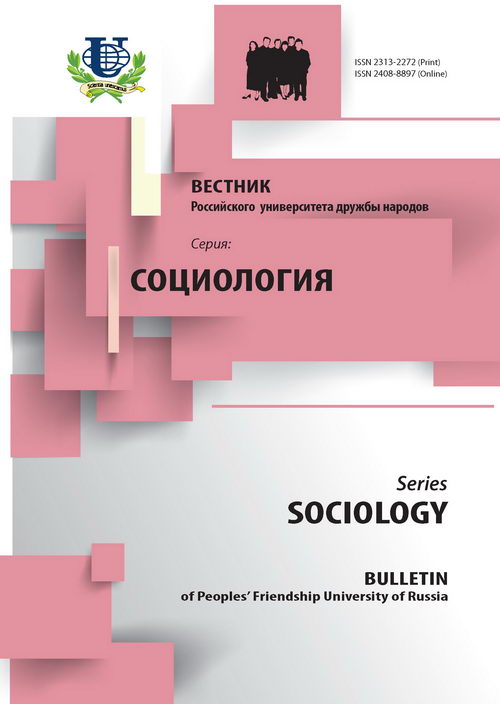No 1 (2011)
- Year: 2011
- Articles: 11
- URL: https://journals.rudn.ru/sociology/issue/view/392
Articles
The "Unfinished Sentences" Technique in Studying Loneliness Phenomenon
Abstract
The article deals with the unfinished sentences technique as a soft, qualitative way to collect and analyze sociological data. The article represents an attempt to describe the main features of qualitative approach to designing, conducting and analyzing the semi-structured data of sociological research based on the unfinished sentences technique and aimed at studying the problem of loneliness. The article also proposes a scheme to apply typological analysis principles to the data obtained through the unfinished sentences technique.
 5-10
5-10


Jean Baudrillard's Concept of Simulacrum: the Methodology of "Aleatory Thinking" and Subject's Transformation in the Consumer Society
Abstract
On the one hand, the theory of Jean Baudrillard, one of the most prominent postmodernist scholars, implies the specific methodology which is associated with fragmentarity as the pivotal characteristic of non-classical rationality. On the other hand, Baudrillard's approach provides a rationale for the type of society which is referred to as the consumer society. The apprehension of the conceptual framework of the French theorist within theoretical sociology perspective with regard to the outlined ideas is carried out in the article.
 11-23
11-23


Social Aspects of Internet Communication: Virtual Community and Communication Personality
Abstract
The new global communication medium gives rise to a new type of discourse that exerts considerable influence on communication practices. The article touches upon the most typical features of Internet communication, while special emphasis is paid to its role in self-identification. The author comes to the conclusion that the virtual medium fosters the development of peculiar communication and cognitive skills which turn out to be indispensable for adequate and efficient Internet communication. Thus, the competence in Internet communication becomes the primary basis for social status ascription in the stratification structure of virtual community.
 24-33
24-33


Demographic Aspects of Sustainable Development Theory
Abstract
The transition to the information society is accompanied by the change in the spectrum of human interactions describing the informational capacity of a particular community as a whole. The article helms the reader to the wide range of diversity in time and geographical space representing it as multiplicative indices of development worked out on the basis of factual demographic evidence.
 34-45
34-45


Sociological Analysis of Contemporary Youth Movements: the Strenghts of Classical Leadership Theories
Abstract
The article is devoted to the study of youth socio-political movements in terms of leadership theories. The author examines the development of leadership theories and provides the analysis of the activities of two youth organization's leaders in the context of the theories involved. In order to analyze the efficiency of leadership the author highlights the qualities essential for an ideal leader of a youth organization and identifies the type of leadership style. Further on, the author considers how far each of the candidates answers the ideal leadership model description.
 46-54
46-54


The Migration Security in Russian Society amid Ethnic and Social Conflicts Aggravation
Abstract
National security protection emerges as an indispensable factor for the development of personality, society, and state amid the increasing complexity of international migration processes. The article touches upon the peculiarities of ethnic and social relations between migrants and members of the host country providing insight into the novel category of "migration security".
 55-63
55-63


The Problem of Modernization and Development of Russian Civil Society: the Dialectics of "We" versus "Me"
Abstract
The article provides insight into the issue of modernization and development of civil society through the lens of national character. The axis of the publication is the following argument: the economic system and the appropriate type of society are constructed by people in accordance with geographical and natural conditions. As the "construction" process advances, the fundamental social values, norms as well as the corresponding type of personality embodying national character take shape according to the prominent activity patterns. It is possible to change national character altering the norms which regulate human behaviour in economic and socio-political spheres. Thus, the Russian non-market-oriented national character has emerged ("We-civilization") as opposed to the Western market-based one ("Me-civilization"). However, things are gradually changing.
 64-70
64-70


Sociologist as a Service Provider. Using Psychology to Support Selling
Abstract
The article helms the reader to the results of the sociological services market observation. A basic selling scheme is outlined with the components of interactions space as well as the set of "must-have" psychological skills and competencies essential for the seller highlighted as factors of high priority. The principal stages of the selling process are identified. The notion of "offeror" who meets the desires of the client purchasing sociological services is introduced. The prominent role of psychological selling techniques is emphasized in the guidelines to be abided by the sociologist in order to prevent potential misunderstandings and conflicts as well as to establish new contacts and keep old ties with the client after making a deal.
 71-81
71-81


Social Institutions in the Framework of Society Regulation
Abstract
The article deals with the unfinished sentences technique as a soft, the qualitative way to collect and analyze sociological data. The article represents an attempt to describe the main features of the qualitative approach to designing, conducting and analyzing the semi-structured data of sociological research based on the unfinished sentences technique and aimed at studying the problem of loneliness. The article also proposes a scheme to apply typological analysis principles to the data obtained through the unfinished sentences technique.
 82-89
82-89


Authors
 90-91
90-91


Nauchnyy zhurnal«Vestnik Rossiyskogo universitetadruzhby narodov. Seriya «Sotsiologiya»priglashaet k sotrudnichestvu avtorov
 92-92
92-92

















